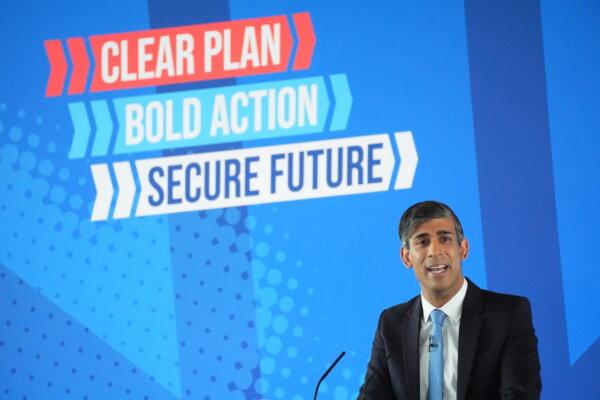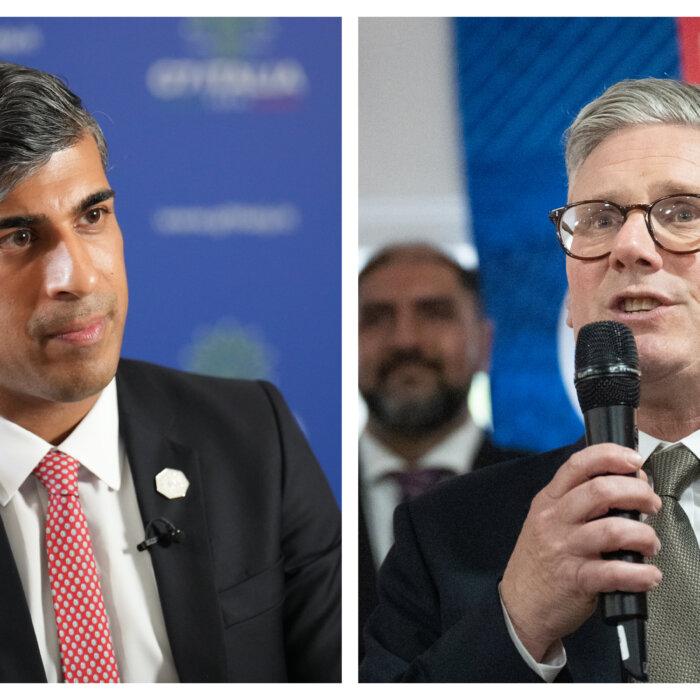At least half of voters are sceptical that the Conservatives, Labour, or Liberal Democrats can afford to deliver pledges they have made in their election manifestos, according to a poll.
This lack of confidence rises to 55 percent for the Liberal Democrats, with just 23 percent believing they can afford their plans.
The Conservatives saw the highest distrust from voters, with almost two-thirds (62 percent) thinking the Tories have not balanced the books with their manifesto, compared with 25 percent who do.
Voters who doubted the viability of Labour’s pledges were asked how they thought it could afford its promises. More than half (56 percent) responded that they think the party will raise borrowing, 53 percent think they will raise taxes, and 55 percent believe the party will simply fail to fully deliver its manifesto.
‘No Indication’ Where Money Will Come From
Sir Keir Starmer launched Labour’s manifesto on June 13, pledging not to raise income tax or VAT, but also promising a cash injection into public services, such as hiring more teachers and cutting NHS waiting lists. This, the Labour leader said, would be paid for by tackling tax avoidance. The party said it would raise £7 billion in revenue from other forms of tax, including imposing VAT on private school fees and closing “loopholes” in the windfall tax on gas and oil companies.The Institute for Fiscal Studies (IFS), an independent economics research institute, issued an initial response to the manifesto, saying that the “trivial” spending and tax increases did not take into account forecast spending plans by the current government. “Especially” with the extra £17.5 billion borrowing over five years to fund Labour’s green prosperity plan, “this leaves literally no room – within the fiscal rule that Labour has signed up to – for any more spending.”
IFS Director Paul Johnson said, “This is a manifesto that promises a dizzying number of reviews and strategies to tackle some of the challenges facing the country.”
Mr. Johnson continued that “delivering genuine change” would require “putting actual resources on the table.”
‘Scepticism’ Over Tory Plans
Mr. Sunak revealed the Conservatives’ plan for the next government on June 11, with focus on tackling immigration and tax cuts. The prime minister said that a new Tory administration would cut national insurance by 2p in the pound and save the taxpayer £12 billion by curbing welfare payments.Mr. Waters continued: “Health-related benefit spending has been rising rapidly since the pandemic and is set to cause an increasingly painful fiscal headache. But the kind of cut the Conservatives are mooting would be difficult to achieve and they have outlined very little in the way of concrete plans.”
He added that to save billions in this way would involve getting one million people (19 percent of the total) off of health-related benefits, “or it could mean applying big cuts to existing claimants, requiring something like a £2,200 cut per claimant per year.”

‘Economically Bad’ Ideas
The Liberal Democrat leader Sir Ed Davey promised a “bold, ambitious and fully costed plan” for social care and the NHS in his manifesto launch on June 6. The plans include free personal care which would be paid for by increasing taxes on banks and closing tax loopholes used by corporations and wealthy people.
“We are already raising more from taxing companies than at any time in decades. Moreover, there are clear risks that their package of tax measures would not raise the £27 billion a year that they claim,“ he said, adding that some of these tax rise measures were ”an economically bad idea.”
“We should not, for example, be taxing share buybacks,” he said.







